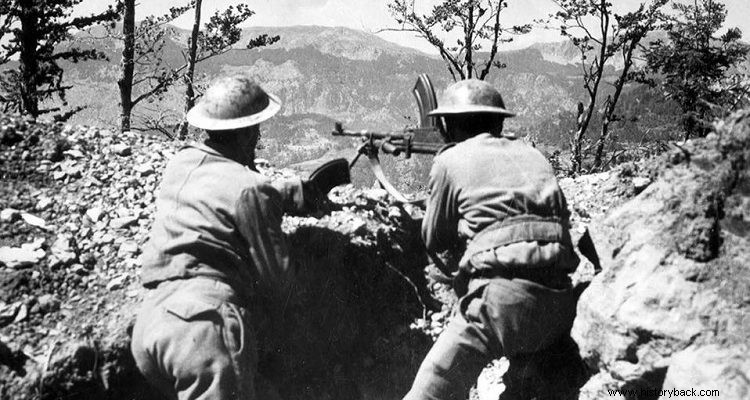
September 1948 was not the best month for the Greek Army (HS). After great sacrifices, Grammos was captured, but in Vichy there was a failure that almost ended in tragedy when a counterattack by the Democratic Army of Greece (DSE - the army of the KKE) broke the front, due to the incompetence of the local administration of the Greek Army.
After this accident, the IS forces withdrew to the location of Falchata - Ag. Kyriaki – Dentrochori – Bokovik covering the city of Kastoria which was on average only 15 km from the front. The defensive site in question was crossed almost vertically by the river Aliakmonas.
Powers and plans
The western parts of the river were occupied by the 45th and 61st Infantry Brigades of the Greek Army (six battalions in total) and the eastern part up to Bikovik by the 3rd Mountain and 73rd Infantry Brigades. The reserve consisted of the 22nd Infantry Division under reconstruction with two battalions, which had been disbanded in Mali Mad.
On the other side of the hill the DSE leadership decided to exploit its success in Mali Mad dealing a new blow to "Truman's mercenary monarcho-fascists" , preventing the reconstitution of the ES forces in the area and even winning the city of Kastoria.
The energy plan that the DSE leadership came up with was risky. It provided for the main blow to be delivered in the area of Flatsata - Dentrochori against the 45th and 61st TXPZ of the Greek Army with parallel employment of the other forces of the army.
The objective was to disrupt the defenders' defensive position by a combination of frontal attacks and deep penetrations with an advance to the villages of Mesopotamia, Koromilia and Lefki where the forces of the Greek Army were under reconstruction.
If they succeeded there would be nothing else between the forces of the DSE and Kastoria that would fall like ripe fruit into their hands for "logistical exploitation" (looting) and (violent) recruitment. The leadership of the DSE considered that the defeat in Mali Mad had undermined the morale of the IS troops to such an extent that they would not stand to fight when they realized that they were in danger of being encircled by its infiltrating units.
So they decided to attack with the 16th, 107th and 108th brigades in the Falchata - Dentrochori sector , with an emphasis on the Dentrochorio area, while the 14th brigade of the DSE would occupy the eastern parts of Aliakmons.
Attack at night
Around 02:00 in the morning of September 19, 1948, the DSE forces that had undertaken the infiltration mission started their march. These divisions managed to take advantage of the formation of the terrain (forests, ravines), to pass behind the support points of the defenders. Then they waited. At 05.00 the other divisions of the DSE attacked frontally. At the same time, the infiltrating units also attacked, reaching the artillery positions of the Greek Army.
A particularly fierce hand-to-hand fight ensued. Grenades, bayonets, knives, sticks, stones were used in abundance. The rivals were caught in the act. However, the DSE did not manage to prevail anywhere. The soldiers, the "monarcho-fascists, Truman's mercenaries", with their supposedly collapsed morale, as their leadership was raving about, stood against the DSE fighters with stubbornness, self-sacrifice and determination.
And as if this was not enough with impetuous and decisive counter-attacks, the forces of the ES cut off the infiltrating units of the DSE. The forces in question were isolated and gradually exterminated in the ravine of Xiropotamos and in the forest of Lapata. The liquidation lasted until September 21.
The operation resulted in a complete and heavy defeat of the DSE. 528 dead rebels were found on the field. Another 135 were captured and 47 were captured wounded. However, it is estimated that the losses of the DSE exceeded 1,000 fighters since many dead and wounded had already been removed from the area. It was a standing tactic of the DSE to remove dead and wounded from the battlefields so that its losses could not be determined by the ESS.
The reason for the defeat for DSE was, primarily, the devaluation of ES. DSE had won an important victory in Mali Mad. But this was not so much due to his own merit or power as to the incompetence of some officers of the SS.
